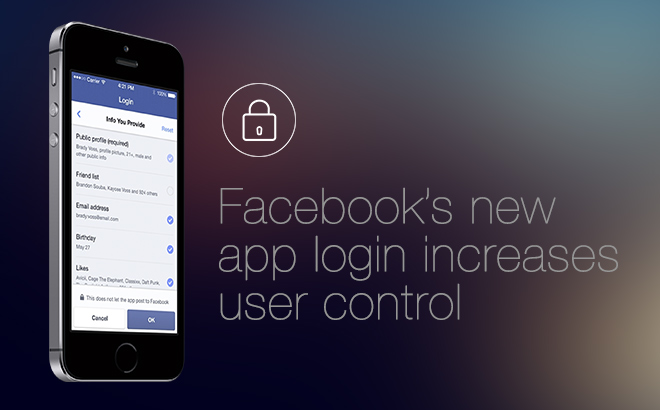Facebook announces changes to app logins


At this month’s F8 conference, Facebook announced that it will be increasing the control users have over the information they share with apps. The change has sparked a flurry of discussion among social media marketers, app developers, and Facebook users as to how this will impact Facebook apps and whether Facebook’s decision makes sense.
In the past, Facebook users had to accept permissions in their entirety, and if the user didn’t like them, their only option was to refuse the permissions and not accept the app. Facebook now gives users two more options: a new version of the standard app login and an anonymous app login. As a result of these changes, Facebook hopes that people will start to place more trust in the blue ‘log in with Facebook’ button.
Standard Facebook app login changes:
The new standard app login will include what Facebook calls “line-by-line control.” This allows users to choose which information they are willing to share with the app by unchecking categories of information they want to keep private. For example, if someone is happy to share their likes with an app but not their friend list, they can remove the friend list from their permissions by unchecking that category in the list. In addition to line-by-line control, the new app login also requires your explicit permission for the app to post to Facebook, and these changes will be introduced in the coming months.
Anonymous Login:
Anonymous login is a new feature that allows Facebook users to log into apps without sharing any of their personal data. The anonymous login is intended for people who want to try out apps without sharing any information about themselves. Once the user understands more about the app and is willing to share additional information, they can upgrade to the full login experience seamlessly in a few clicks. Facebook’s intention seems clear: allow people to try an app using the anonymous login in the hope that once they become more familiar with it, they will feel comfortable enough to share more information. The anonymous login is being tested with a few developers currently, and is expected to become widely available in the following months.
It is important to be aware that the anonymous login is not really anonymous. This is because Facebook still knows who you are. What anonymous login means is that you don’t have to give third-party developers any personal information before using their apps. Facebook however will still gather information about the apps that you are using, which could then be used to personalise your Facebook experience or even possibly target you with ads.
Control panel:
Facebook has also announced that it will redesign the app control panel to help users keep track of their apps. The new design will make it easier for users to see which apps they use, manage the information they want to share, and to remove apps completely. This change will take effect in the next few weeks.
What does this mean for businesses?
When creating an app, brands will need to think clearly about its main objective. A long list of permissions will be unattractive, and users could be more likely to edit them or may even opt for the anonymous login instead, so it is important to only collect information that is relevant for the app’s functionality.
Apps will also need to be designed to accommodate both logged-in users and anonymous users. While logged-in users will have a much more personalised experience, there still needs to be a default for anyone not willing to share any information. For example, when entering a competition, logged-in users may just need to click a “submit” button to allow the required information to be retrieved from their Facebook account, while anonymous users will have to be able to enter their details into the required fields to submit their data. Brands should also remember that anonymous users have the potential to upgrade, so should still aim to provide them with a quality experience and incentives to upgrade.
Brands will need to be prepared to only receive data that the user is willing to share, so apps can no longer be seen as only data capture tools. Instead, they should be viewed as providing users with a better experience on Facebook, with a bonus of data capture if a user feels their relationship with the brand is strong enough to warrant providing that information. As a result app engagement should be measured by app usage and upgrade conversion rather than how many email addresses have been collected.
Facebook’s goal
So why is Facebook making these changes? In addition to increased demand for privacy, we believe this is part of a larger campaign to make people more comfortable with Facebook logins, which will help to increase people’s confidence in using Facebook as their universal sign-in for the entire web and app environment. As app developers we’re particularly interested in seeing how people adapt to the new login options and how it will impact the apps we plan and build in the future.
Want to learn more about our Facebook apps?
Contact our team of web developers today to find out more about how we can create a Facebook app for your Page on 0116 254 9888.



